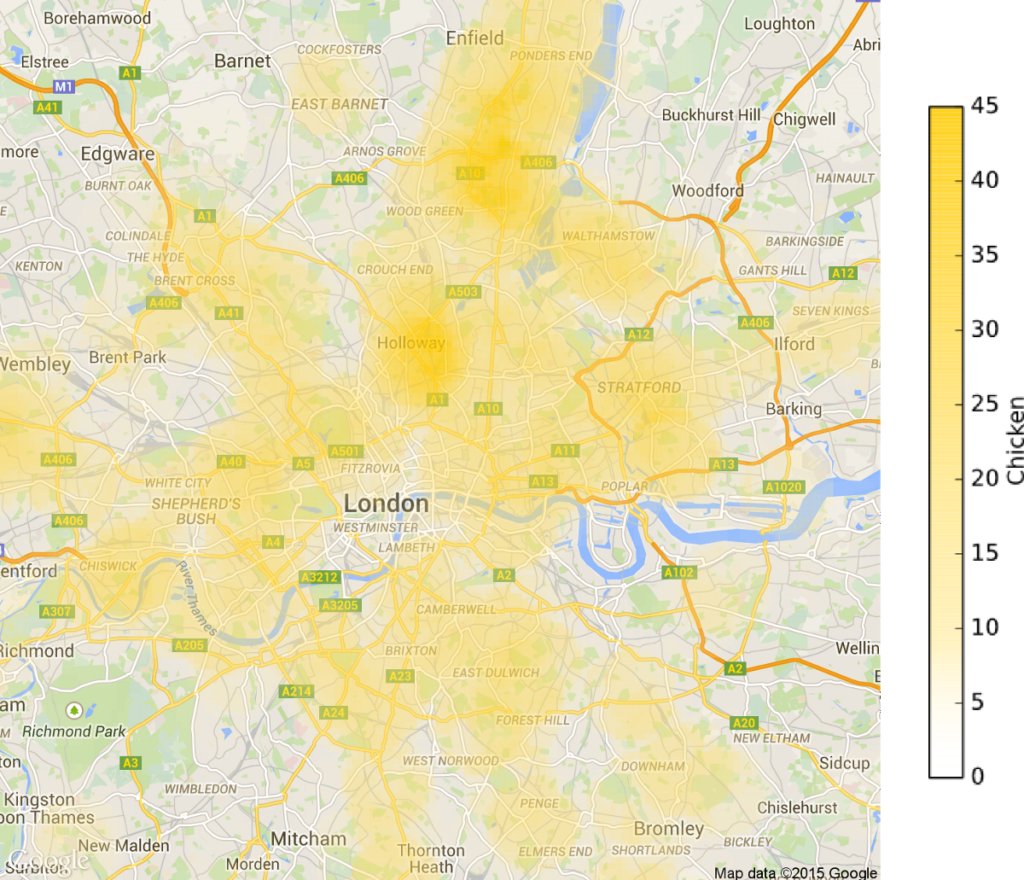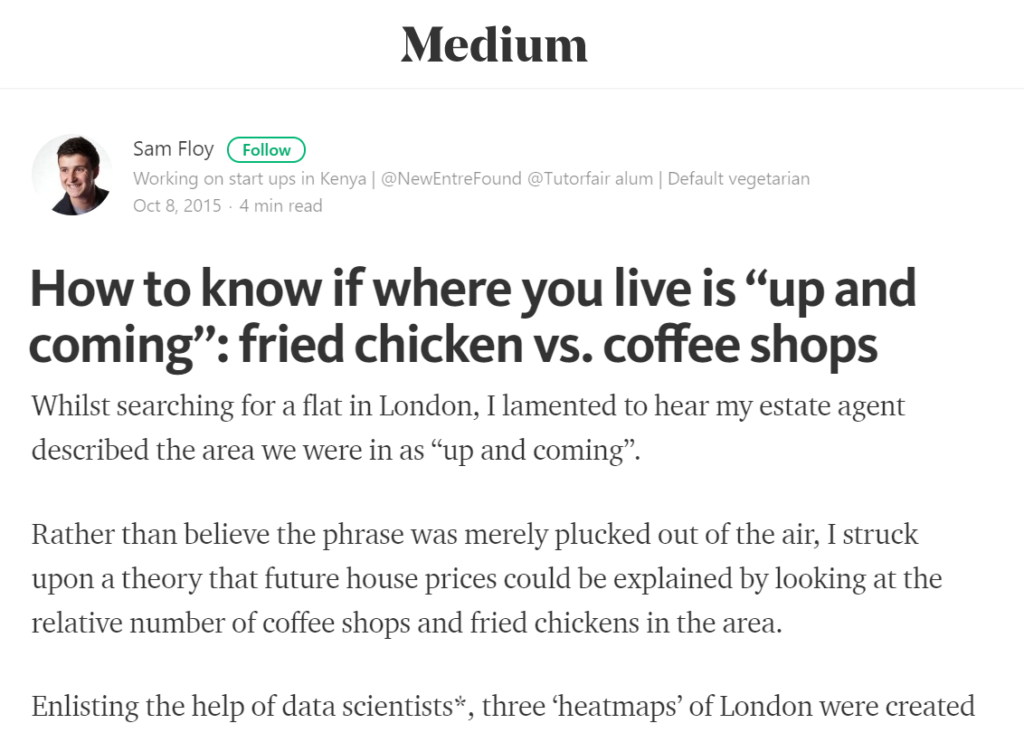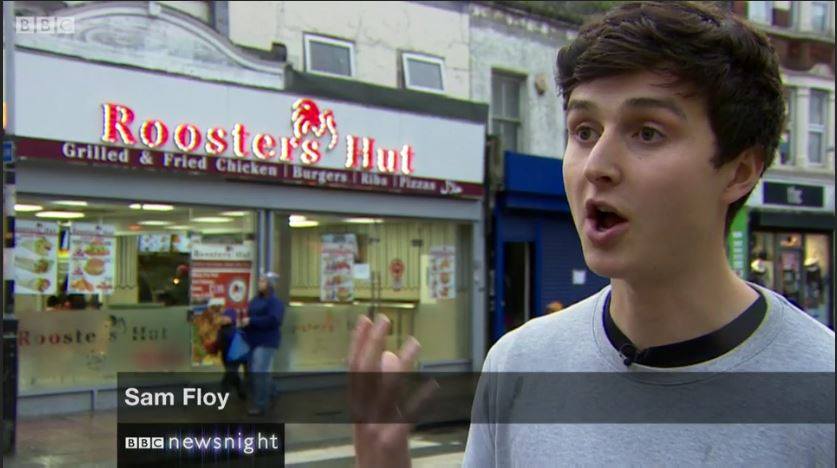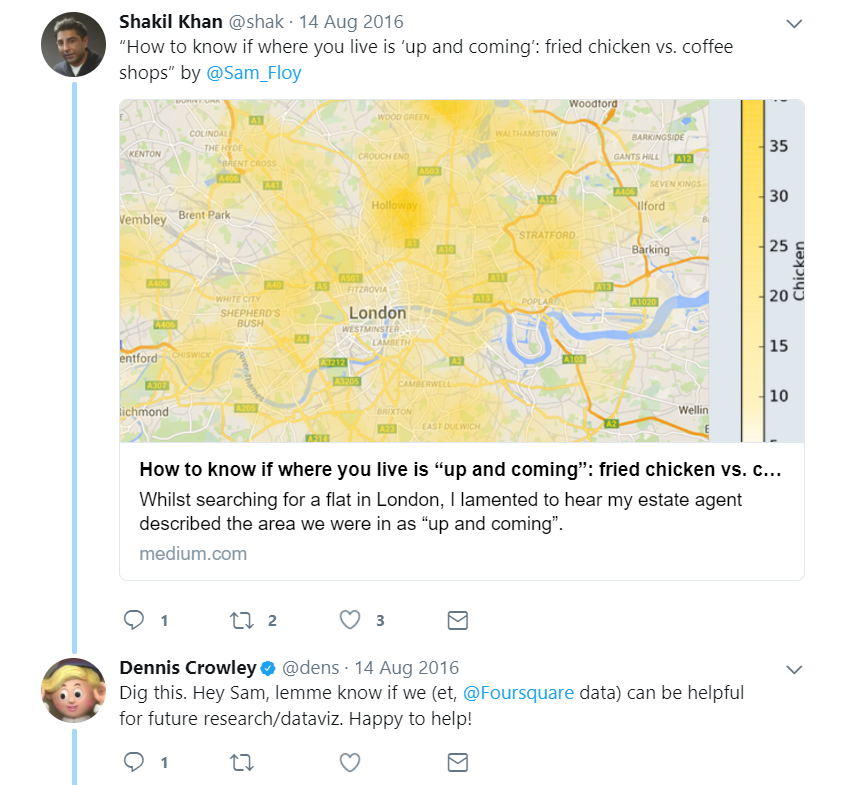In October 2015 I published a blog post which, for want of a better word, went viral.
It was about finding the next up and coming places to live in London through looking at the relative density of coffee shops to fried chicken shops, and then comparing to house prices.
Where did it come from?
It started, quite literally, as a joke.
I was taking a course in stand up comedy, and had to come up with something funny to put in my set.
One way in which to generate humour is through taking trivial observations, and then running with them to an absurd extreme.
An observation I’d had from walking around by neighbourhood in East London was the frequency in which one passes fried chicken shops, and how this differed from when I went to see friends in other parts of the city, where the more common establishment was the coffee shop.
With this kernel, it was then a few short steps to imagine a world in which you could predict house prices (and therefore the next “up and coming” areas) through an application of where the chicken shops hadn’t turned into coffee shops.
A heatmap emerges
We had a project on at work where we were creating heat maps for where tutoring was taking place across London.
A couple of data scientists from The ASI were working with us to construct the maps, and at the water cooler one day I mentioned the concept of finding areas on the fried chicken and coffee shop divide, and posited the notion of visually displaying it.

One of the data scientists said it should be plausible to make such a map and so we spoke about how we’d go about constructing, and after a few weeks had some funky coloured graphs which showed the various “hot spots” of the capital.
Sending it the press
It felt like something which newspapers, or certain websites might find interesting, and so after writing up a blog post, I sent an email to various journalists who I thought might like to feature it/ have it as “an exclusive”.
There was some interest from The Guardian and BuzzFeed but both ultimately decided it wasn’t for them.
I therefore decided to publish it on Medium (a blog platform) and look to send it around to a few places after that.
It starts getting picked up
The link was put on the reddit/r/london forum and soon began getting shared.

Throughout the day my phone kept buzzing saying that the article had been “Recommended” by others and I got messages from friends saying they’d found it funny and that someone they knew had just shared it with them.
The phone starts ringing
I also began getting tweets from journalists asking if they could talk.
Throughout the day I spoke with various writers of mainly London-centric newspapers about the story, giving a few quotes to accompany the story.
The Evening Standard wrote a piece which got decent coverage, and after a few days the article was further featured in the Metro, Londonist and City AM.
The cameras start rolling
There was also an invitation from a couple of TV shows to have me in and speak about the concept.
I did a radio interview with BBC London, went into the studios of London Live and featured (very briefly) on Newsnight

Where it’s ended up
There have been numerous places where the article and the piece have cropped up.
A lot of real estate based websites have featured it, and I got a message saying how Southwark Council included it in their residents’ newsletter (Peckham came out as the most up and coming spot).
The New Scientist wrote a little byline, and it featured in an article by The Guardian about the rise in coffee shops.
A US website called Sumo (which is about how to build an audience) references it in one of their popular posts and every once in a while there’ll be a flurry of article views and tweets as the article gets shared around with other circles.
Unlikely connections
What has been particularly interesting is the wide array of people who have got in touch as a result.
Fairly frequently I will receive an email from a company that does something to do with real estate about how they might utilise the research and, interestingly, it seems to go down well with Geography teachers who need material for their urbanisation modules.
There have been university students who have been in touch about including it in their theses, and people asking me to comment on the rising trend of “gentrification”.
I spoke with a guy who draws cartoons of fried chicken shops (seriously), was in conversation with the founder of Foursquare, and even had an unknown (distant) family member reach out after watching Newsnight and seeing that we shared an unusual surname.

What’s next for the Gentri-Fried Chicken Index?
This is a question that I muse on every once in a while.
There are lots of directions in which this concept could be taken, and explored, and so I am always interested in looking at how this could be developed, and become a genuinely useful/ entertaining tool for people.
It builds into wider macro themes around the use of open data and bringing complex issues to light through intuitive visualisation.
Recreating the maps
The blocker has come with an inability to recreate the heatmaps with updated data. The data scientist I was working with has decided he doesn’t want to do this any more, and so once I can sort this, then it should be possible to try out some of the ideas.
Watch this space…
Conclusion
Of all of the things I’ve done, it is disheartening interesting that a lot of people now associate with me as “the chicken guy”.
I like to look at it through the lens of how data can be used to explain complex concepts in a way which makes it approachable to everyone, which is a common thread throughout a lot of the work that I do.
In any case, if this is your first interaction with the chicken shop: coffee shop analysis, then I hope it was amusing.
~~ HELP WITH THIS? ~~
If you, or someone you know, might be interested in working on this and making something more of the Gentri-Fried Chicken concept then please do get in touch! I’d be particularly interested in speaking with people who are looking to build their experience in understanding map APIs, and other data visualisation techniques.
Feel free to drop me a message view the contact page.